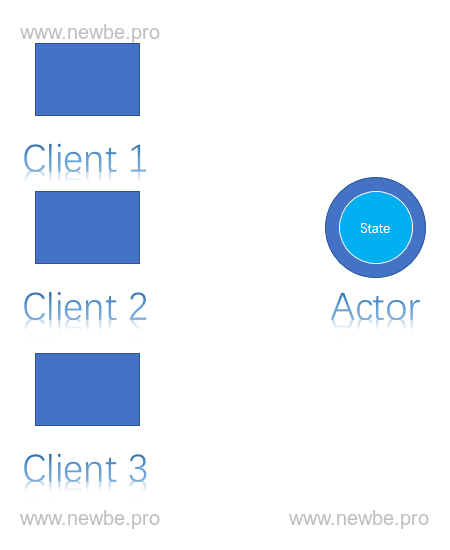Actor Pattern
Actor Pattern is a kind of concurrent programing pattern.It is convenient and efficeint to solve some system concurrency problems.The concurrency problem here is talking about that it would curror error if there are multiple request to modify the same data as the time.It would raise if you are using multiple-thread programing.To give a simple example, if you use 100 threads in a non-synchronous lock to perform a s. . . operation on an int variable in memory.Final result of that variable should be less than 100 in common.Let`s take a look at how actor pattern could handle this problem.
First of all, you can consider an Actor as an normal object here.In an object-oriented language (Java, C#, etc.), Actor can be considered an object created through a new keyword.And it includes some special features:
It own it`s own state。All object could contains some properties or fields, it is normal in object-oriented language.In Actor Mode, these attributes are collectively referred to as Actor status (State).The state of actor should be matained by itself.
There are two points:
Firstly, state of actor must be change by itself. If you want to change the state, you have to call the method of actor.

Secondly, state of actor is matained in actor, it is unable to share to any other object.In particularly, 'non-sharing' mentioned here also emphasizes that it cannot change the state of the actor through the change of an external properties.This is mainly to distinguish it from some programming languages with the "object reference" language feature.For example the public property of the class:in C#, if this class is referenced, the property in the class can be changed when obtained externally.It is not allowed to do so in actor pattern.

But it is still allow to retrive data out of the state by method.

Single thread。Actor could only accept one call at a time.The threads described here refer not exactly to threads in the computer, and the words used to highlight the "feature of Actor that can only handle one request at a time" are used.If the current Actor is accepting a call, the remaining calls are blocked until the end of the call, and the next request is not allowed to enter.This is actually similar to a mechanism for a synchronous lock.This mechanism avoids the possibility of concurrency issues when modifying the internal state of actor.A specific specification:allows Actor to ++ action on an int variable in state if you call an Actor with 100 threads.The final value for this state must be 100.

However, single threads are not absolute, allowing concurrent processing in the absence of concurrent requests.For example, reading the state in the Actor, which usually does not have concurrency issues, allows concurrent operations at this time.
